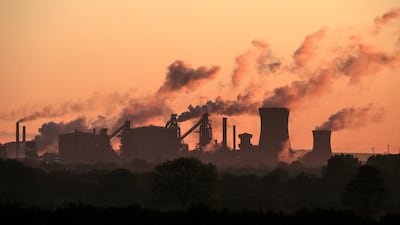Britain’s Chancellor Rishi Sunak is considering whether to sign off loans for industries which are being badly affected by the rise in global gas prices.
High energy costs have led to fears of businesses shutting factories or going to the wall.
UK Business Secretary Kwasi Kwarteng submitted a formal proposal to the Treasury on Monday, which reportedly includes loans and other support measures worth in the low hundreds of millions of pounds.
A government official was quoted by the Financial Times as saying grants will not be considered, adding: “These are viable businesses, so we’ll want some of the money back.”
Business leaders have for weeks been warning about looming disruption to supply chains and the threat of companies going under in the coming months.
Mr Sunak is preparing to publish a public spending review and budget on October 27.
He is said to be determined to assess what the companies affected are doing to absorb the extra costs of rising gas prices.
Last week, Mr Kwarteng held a series of meetings chaired by Dr Richard Leese, chairman of the Energy Intensive Users Group, an umbrella group spanning multiple industries.
He discussed possible ways to help energy intensive industries, such as steel, ceramics, glass and paper.
Dr Leese told BBC Radio 4's Today programme attendees tabled a series of proposals aimed at keeping the supply chain going through the winter months, and that they feel confident Mr Kwarteng understands the “urgency” needed to address the issues.
He said it was “absolutely crucial” for the Treasury to act swiftly and approve the request for loans.
“We need this preventive action to stop the issue escalating further,” he said. “We’ve already seen pauses in production in steel and fertilisers.”
Dr Leese said recent warnings from industries affected by a rise in gas prices have laid bare the “unprecedented circumstance” they have found themselves in, but he also said the taxpayer should not be expected to pay for loans.
“The Treasury taxes and levies our energy intensive industries more than other European governments so it’s about providing relief from taxes and levies that are already being paid and not adding an additional burden to the tax payer,” he said.
Prime Minister Boris Johnson, who is on holiday in Marbella, Spain, is in favour of offering loans to the businesses, according to The Times.
The newspaper said companies threatened with closure would be given cash injections to prevent them from shutting down over the winter, and to stop thousands of jobs being lost.
Dave Dalton, chief executive of British Glass, who was among the business leaders who attended the meeting with Mr Kwarteng on Monday, suggested handouts or price caps would not be offered by the Treasury.
He said any loans given would likely be similar to those given out during the Covid-19 pandemic to struggling businesses.
However, Mr Dalton said Mr Kwarteng appeared doubtful the Treasury would respond favourably to his request.
“He didn’t give me the confidence that [the] Treasury were in the mood to be any more liberal,” Mr Dalton said.
It comes as Tory front-bencher Lord Agnew of Oulton said soaring energy costs were nothing to do with supply shortages, but were the result of a “geopolitical move” by Russia to put pressure on Europe.
The Treasury minister’s comments appeared to go further than the government has gone before in pointing the finger directly at Moscow for the current crisis.
His comments follow claims Russia has been limiting gas supplies in a bid to prod regulators in Europe into moving quickly to certify the controversial new Nord Stream 2 pipeline.


